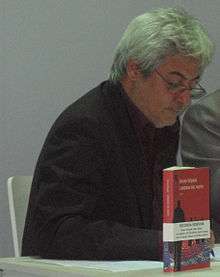Bruno Arpaia
Bruno Arpaia, born in Naples (Italy) in 1957, is an Italian writer and journalist.[1]
Bruno Arpaia | |
|---|---|
 Bruno Arpaia | |
| Born | 1957 |
| Nationality | Italian |
| Alma mater | University of Naples |
| Occupation | Writer, Journalist |
Life
After his degree in Political Sciences and a specialisation in American History at the University of Naples, he taught there and then became a journalist with the Italian newspaper Il Mattino of Naples, subsequently moving to Milan in 1989, where he worked for the daily La Repubblica.
In 1990 he published his first novel, I forestieri (The Foreigners), which won the Bagutta Prize the following year. Arpaia published another three novels, after leaving the newspaper La Repubblica in 1998, in order to dedicate himself solely to writing and freelance journalism.
L'Angelo della storia (Guanda, 2001) is his most successful novel, also being selected for the prestigious Campiello Prize in 2001. Translated into English in 2006 with the title The Angel of History by Minna Proctor, under the patronage of the Scottish Arts Council and the Italian Cultural Institute, it tells the partly fictional story of philosopher Walter Benjamin and a young Spanish militant in 1940. Arpaia's twofold narrative retraces Benjamin's flight across Europe and the Spaniard's youthful activism, as both men battle to assert their beliefs in the face of ultimate extinction.
Arpaia lives in Milan and currently alternates between translation, journalism and writing novels. He is also a publishing consultant for several Italian newspapers and publishing houses.
Bibliography
- (in Italian) I forestieri, Leonardo Editore, 1990.
- (in Italian) Il futuro in punta di piedi, Donzelli, 1994.
- (in Italian) Tempo perso, Marco Tropea editore, 1997; Guanda, 2003.
- (in Italian) L'Angelo della storia, Guanda, 2001.
- (in English) The Angel of History, Canongate, 2006
- (in Italian) Il passato davanti a noi, Guanda, 2006.
- (in Italian) Per una sinistra reazionaria, Guanda, 2007.
- (in Italian) L'energia del vuoto, Guanda, 2011.
- (in Italian) Qualcosa, là fuori, Guanda, 2016.
Review
Arpaia retells the Benjamin story in alternate chapters, in the third person, with counterpoint chapters in the first person by Laureano Mahojo, an anti-Franco Loyalist who spent most of his life in exile in Mexico. In the novel, Laureano meets Benjamin on the refugee trail as the writer limps into Port-Bou, the Spanish village where he committed suicide to avoid being sent to France by the border guards. Benjamin knew that, as a Marxist and Jew, as well as an outspoken critic of fascism, he would not have been greeted warmly by the Gestapo.[2]
Bruno Arpaia's new novel doesn't aim to be an analysis of Marxist philosophy (thank heavens). Rather, he has fictionalised the end of Benjamin's life, as the philosopher escaped the Nazis for a pre-war France that was little more accommodating than Germany. Charting the equally unpleasant adventures of Laureano, a communist rebel in flight from Franco's Spain, Arpaia prepares us from the off for the final crossing of their paths at the end of the novel.[3]
References
- http://www.zam.it/home.php?id_autore=613
- Jay Parini (16 December 2006). "Crossing the hills: The Angel of History, Bruno Arpaia's fictionalised account of Walter Benjamin's last years". The Guardian.
- Lionel Shriver (26 Nov 2006). "When the Marxist philosopher met the communist rebel". The Telegraph.